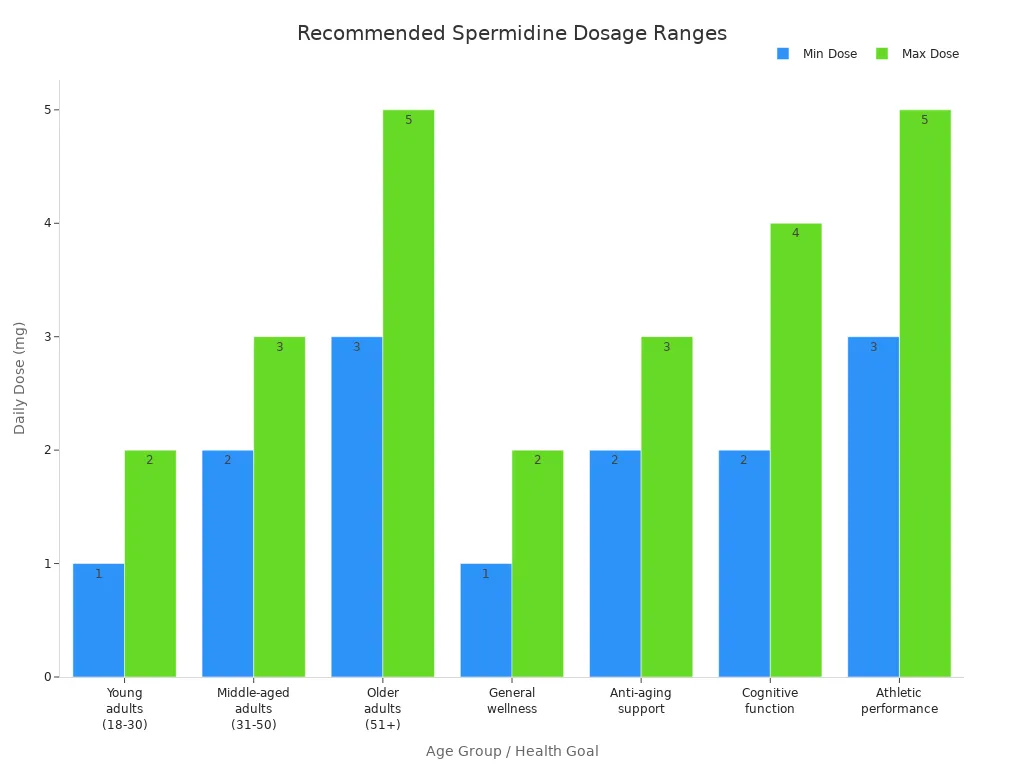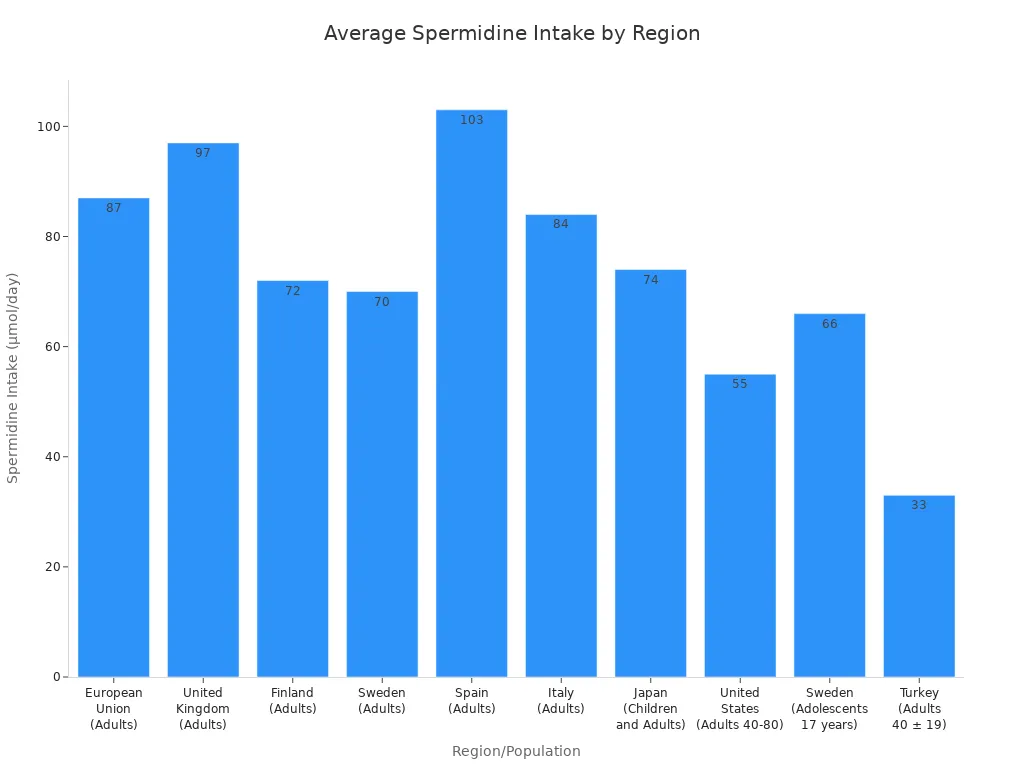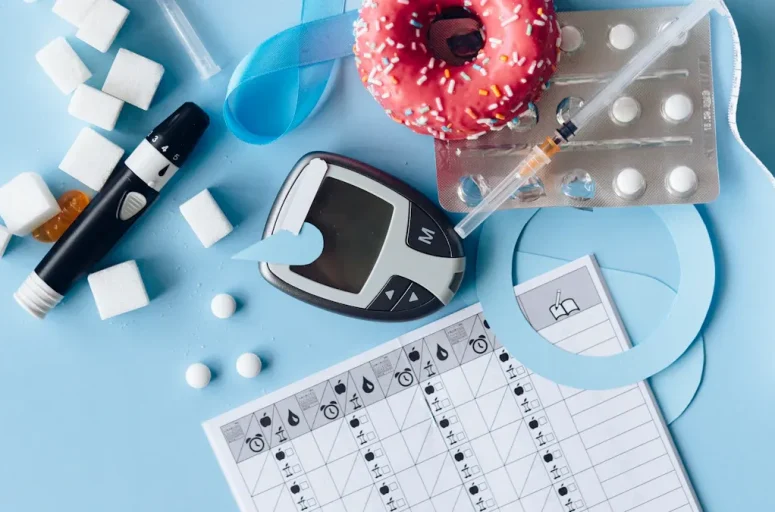
Medical Disclaimer: This information is for educational purposes only. Always consult your healthcare provider before starting or changing any supplement regimen.
If you wonder how much spermidine should I take for autophagy, most research suggests a daily dose of spermidine between 1–5 mg, with up to 6 mg considered safe for adults. The optimal spermidine dosage depends on your age and health goals. You can use this spermidine dosing guide:
Age Group / Goal | Recommended Daily Spermidine Dosage (mg) |
|---|---|
Young adults (18-30 years) | 1-2 |
Middle-aged adults (31-50 years) | 2-3 |
Older adults (51+ years) | 3-5 |
General wellness maintenance | 1-2 |
Anti-aging support | 2-3 |
Cognitive function | 2-4 |
Athletic performance | 3-5 |

Start with a low daily dose of spermidine supplement and increase gradually. Most studies report excellent tolerability, even at higher doses. Always discuss the recommended spermidine intake with your doctor before taking spermidine supplements.
Key Takeaways
Most adults can safely take 1 to 5 mg of spermidine daily to support autophagy and health.
Start with a low dose, like 1 mg per day, and increase gradually while watching for side effects.
Older adults and athletes may benefit from higher doses within the recommended range.
Take spermidine supplements with meals and consider splitting doses to improve absorption and reduce stomach discomfort.
Spermidine is generally well tolerated; mild side effects like bloating or headaches are rare and usually temporary.
Consistency matters—take spermidine at the same time daily to maintain steady levels and see benefits over time.
Consult your healthcare provider before starting or changing your spermidine dose, especially if you have health conditions or take medications.
Track your progress by noting changes in energy, mood, and skin health to understand how spermidine affects you.
Optimal spermidine dosage
Typical spermidine dose
When you look for the optimal spermidine dosage, you will find that most expert recommendations suggest a daily intake between 1 and 5 mg. This range supports health, longevity, and autophagy. Many clinical studies use doses in this range, and most people tolerate it well. Some research uses up to 6 mg per day, often split into smaller doses for better absorption and comfort.
You can see how typical spermidine doses compare in human studies:
Context / Study Type | Safety and Efficacy Notes | |
|---|---|---|
0.6 – 40 | Human clinical trials, durations from weeks to a year | No significant adverse effects reported across this range |
1.2 – 3.3 | Most common doses in clinical trials for cognitive benefits in older adults | Well tolerated, positive cognitive effects reported |
40 | Short-term use in healthy older men | Safe and well tolerated, no adverse events |
0.6 | Combined with other compounds (e.g., AM3, hesperidin) | Safe, showed immune and biological age improvements |
Most clinical trials for cognitive health use 1.2 to 3.3 mg daily. Some studies in Europe show that people get about 10-15 mg of spermidine from their diet each day. However, supplement doses are usually higher than what you get from food. You should not assume that high dietary intake means you can safely take very high doses of spermidine supplements.
Here are some evidence-based recommendations for spermidine supplementation:
Start with a low dose, such as 1 mg per day.
Gradually increase your spermidine dose while watching for side effects.
Split your daily dosage into two or three smaller doses if you have a sensitive stomach.
Take spermidine supplements with meals to improve absorption and reduce digestive discomfort.
Older adults and athletes may benefit from higher doses within the recommended range (3-5 mg).
Most benefits for autophagy and longevity occur within the 1-5 mg range.
There is no official upper limit, but you should not exceed 6 mg daily without medical advice.
A clinical study gave participants 6 mg of spermidine per day, divided into three doses. After three months, the study found improved autophagy and no harmful effects. This supports the safety and effectiveness of this dosage for most adults.
High-dose spermidine safety
You may wonder if higher spermidine doses offer more benefits. Some studies have tested doses up to 40 mg per day in healthy adults for short periods. These studies did not report serious side effects or health problems. Animal studies used even higher doses, but these were much greater than what humans would ever take.
Here is a summary of high-dose spermidine safety findings:
Evidence Type | Details | Dose/Duration | Outcome/Conclusion |
|---|---|---|---|
Human Clinical Trial 1 | Healthy older men (50–70 years) | 40 mg/day for 28 days | No significant changes in health markers; no adverse events |
Human Clinical Trial 2 | Older adults with cognitive decline | 1.2 mg/day for 3 months | No safety concerns; high compliance |
Pharmacokinetic Studies | Healthy adults | 15 mg/day and 40 mg/day | No harmful accumulation; no adverse effects |
Animal Toxicology Studies | Rats and mice, very high doses | Up to 728 mg/kg/day (rats) | No adverse effects at these levels |
Most people tolerate spermidine supplementation well, even at higher doses. Mild side effects can include bloating, upset stomach, or mild headaches. These effects are rare and usually go away if you lower your dosage or take spermidine with food.
Animal studies show that extremely high doses (hundreds of times higher than human doses) can cause changes in appetite, liver enzymes, and mineral balance. These findings do not apply to normal human supplementation. No serious toxicity or increased risk of stroke has been found at standard human doses.
Tip: Always start with the lowest effective spermidine dose and increase slowly. Monitor your body’s response and talk to your healthcare provider before using high doses.
Spermidine supplement safety
Tolerability of spermidine dosage
You may wonder if spermidine is safe for consumption and how your body might react to different dosages. Most clinical research shows that spermidine supplementation is well-tolerated. You will likely experience only mild side effects, especially when you follow recommended dosages. The most commonly reported side effects of taking spermidine include digestive discomforts such as stomach upset, nausea, and occasional bloating. These symptoms usually appear at higher doses, above 5 mg per day, and tend to fade as your body adjusts.
Note: If you notice mild headaches or gluten sensitivity, check the source of your spermidine supplements. Some products use wheat germ, which may trigger reactions in sensitive individuals.
Rarely, allergic reactions can occur. You should watch for skin rashes, swelling, or difficulty breathing, especially if you have allergies to polyamine-rich foods. Most people find that spermidine is safe for consumption at recommended levels. Long-term safety data remain limited, so you should always consult your healthcare provider if you have health conditions or take medications.
Clinical trials have tested spermidine dosages up to 40 mg per day in healthy older men for 28 days. These studies found no significant adverse effects or changes in health markers. Animal studies also support a wide safety margin, with no observed adverse effects at much higher doses. You can see the safety margins established in published studies:
Evidence Type | Details |
|---|---|
Clinical Trial | 40 mg/day for 28 days in healthy older men showed no significant adverse effects or changes in health parameters. |
Preclinical Toxicology | No observed adverse effect level (NOAEL) at 728 mg/kg body weight/day in rats. |
Previous Clinical Data | Lower doses (1.2 to 15 mg/day) from plant extracts have limited safety data. |
Safety Assessments Included | Clinical chemistry, hematology, lipid profile, body weight, blood pressure, and adverse events. |
Who should avoid spermidine
You should always start with a low spermidine dosage and increase gradually. This approach helps minimize mild digestive discomfort and allows you to monitor your body’s response. Here is a simple guide for safe use:
Begin with a low dose, such as 1 mg once or twice daily with meals.
Increase the dosage slowly, based on your tolerance and health needs.
Adjust your dosage according to body weight and age.
Do not exceed 10 mg daily unless your doctor advises you.
Consult your healthcare provider before starting, especially if you have health conditions or take medications.
Some people should avoid spermidine supplementation or use extra caution:
You have allergies to wheat germ or polyamine-rich foods.
You experience severe digestive issues after taking spermidine.
You have chronic health conditions or take prescription medications.
You are pregnant, breastfeeding, or under 18 years old.
If you belong to any of these groups, talk to your doctor before using spermidine. Monitoring your health and adjusting your dosage with professional guidance helps you stay safe and get the most benefit from spermidine.
Personalizing spermidine dosage
Age and health status
Your age and health play a major role in determining the right spermidine dosage. As you get older, your body produces less spermidine naturally. This decline can affect autophagy, the process your cells use to clean and renew themselves. Research shows that food-derived spermidine averages about 1 mg daily, but supplementation helps restore youthful levels. If you do not notice benefits at a low dose, you can gradually increase your intake. Flexibility is important because everyone responds differently.
You should also consider your health status before adjusting your dosage. Spermidine supplementation is generally safe and well tolerated, even over long periods. Most people experience only mild digestive discomfort at first, which usually goes away. However, you need to use caution if you have a history of cancer or kidney problems. Polyamines like spermidine may affect tumor growth or kidney function in rare cases. Always talk to your healthcare provider if you have underlying health conditions or take medications.
Tip: Start with a low dose and increase slowly. Monitor your body’s response and consult your doctor if you have any health concerns.
Key factors that may require dosage adjustment:
History of malignant neoplasms (cancer)
Kidney health concerns
Digestive sensitivity
Use of prescription medications
Age-related decline in natural spermidine production
Dietary intake of spermidine
Your daily diet provides some spermidine, but the amount varies by region and food choices. Most people get between 0.3 and 0.8 mg of spermidine from foods like wheat germ, aged cheese, soybeans, mushrooms, and peas. European adults often consume more spermidine than Americans, mainly due to dietary habits.
Region/Population | Estimated Average Spermidine Intake (μmol/day) |
|---|---|
European Union (Adults) | ~87 |
United Kingdom (Adults) | ~97 |
Finland (Adults) | ~72 |
Sweden (Adults) | ~70 |
Spain (Adults) | ~103 |
Italy (Adults) | ~84 |
Japan (Children and Adults) | ~74 |
United States (Adults 40-80 years) | ~55 |
Sweden (Adolescents 17 years) | ~66 |
Turkey (Adults 40 ± 19 years) | ~33 |

You may find it difficult to reach the recommended spermidine dosage for daily maintenance through diet alone. Supplementation helps you achieve optimal levels, especially if your diet is low in spermidine-rich foods. When you calculate your total intake, include both dietary and supplemental sources. This approach prevents excessive intake and supports safe, effective results.
How to take spermidine supplement
Timing and consistency
You want to know how should spermidine be taken for the best results. Consistency matters most. Take spermidine at the same time each day to help your body maintain steady levels. Many people choose to take their supplement with breakfast or lunch. This routine makes it easier to remember and supports regular absorption. If you split your dose, take half in the morning and half in the evening. This approach can help reduce stomach discomfort and improve how your body uses spermidine.
Tip: Set a daily reminder on your phone or calendar. Staying consistent helps you see benefits over time.
Absorption tips
How to take spermidine for maximum effect depends on the form you choose. Some methods improve absorption and make spermidine more effective. You can compare different options in the table below:
Method | Description | Mechanism / Benefit |
|---|---|---|
Liposomal Spermidine | Spermidine encapsulated in liposomes | Protects spermidine through digestion, enhances cellular uptake, improves bioavailability |
Fermented Wheat Germ Extract | Natural source of spermidine with high purity | Provides improved bioavailability, promotes autophagy, supports mitochondrial function |
High-Purity Synthetic Spermidine | Synthetic supplements with high purity | Ensures maximal absorption and utilization, supports longevity and cellular health |
Additional Factors | Diet, fasting habits, gut microbiota variations | Influence individual absorption rates, highlighting need for personalized supplementation approaches |
You can boost absorption by taking spermidine with food, especially healthy fats. Some people find that fasting or eating a light meal before taking spermidine helps their body use it better. Your gut health also plays a role. If you have digestive issues, choose a high-purity or liposomal supplement. Always read the label and follow the instructions for your chosen product.
Combining with other supplements
You may wonder how should spermidine be taken with other supplements. Many people combine spermidine with other nutrients to support overall health and longevity. Popular choices include:
NMN (Nicotinamide Mononucleotide): Supports energy metabolism and mitochondrial health.
Resveratrol: Acts as an antioxidant and helps with cellular repair.
Senolytic compounds (fisetin, quercetin): Help clear aging cells and reduce inflammation.
These supplements work together with spermidine to target autophagy, energy production, and cell renewal. If you decide to combine supplements, start with low doses and increase slowly. Watch for any side effects and talk to your healthcare provider before making changes to your regimen.
Note: Combining supplements can offer extra benefits, but you should always check for interactions and follow professional advice.
Expected results from spermidine dose
Timeframe for autophagy benefits
You may wonder how quickly you can expect to see the benefits of spermidine supplementation, especially if your goal is to promote autophagy and support longevity. Research in animals shows that spermidine can trigger cellular autophagy and mitophagy soon after supplementation begins. In mice, scientists observed improvements in heart function and reversal of aging markers even when spermidine was introduced later in life. These findings suggest that you do not need to wait years to notice positive changes. While exact timing in humans is not always clear, many people report feeling initial benefits such as better well-being and skin quality within a few weeks.
Several factors influence how fast you experience these benefits:
Diet rich in spermidine-containing foods helps your body absorb and use the supplement more effectively.
Age and baseline health play a role. Older adults often see more pronounced benefits because natural cellular autophagy declines with age.
Lifestyle choices like regular exercise and stress management can speed up results.
Consistency matters. Taking spermidine every day supports steady cellular autophagy and long-term longevity effects.
Combining spermidine with other supplements such as NMN or Resveratrol may enhance and accelerate outcomes.
Everyone responds differently due to genetics and environment.
You might notice small improvements in energy or skin within weeks, but deeper anti-aging and longevity benefits usually require several months of regular use.
Signs of autophagy
You may ask how to know if spermidine is working to activate cellular autophagy in your body. Scientists use several methods to measure autophagy activation in research. In human studies, they often look at immune cell function and molecular markers. For example, increased autophagic flux in T cells, higher IFNγ secretion, and greater perforin expression all signal that cellular autophagy is active. These changes help your immune system work better and support healthy aging.
Biomarker / Measurement | What It Shows | What Happens with Spermidine |
|---|---|---|
Autophagic flux | Rate of cellular cleanup and renewal | Increases, especially in older adults |
IFNγ secretion | Immune cell activity | Goes up, showing better immune response |
Perforin expression | Ability of T cells to fight infections | Increases, linked to autophagy |
Mitochondrial mass | Health of cell energy factories | Decreases, showing mitophagy |
Researchers also use animal models to check for autophagy by looking at tissue samples and protein markers. They measure changes in proteins like caspase 3 and Beclin 1, which show that cellular autophagy is happening. In your daily life, you may notice signs such as improved energy, better recovery from exercise, healthier skin, and sharper thinking. These are indirect signs that your body is benefiting from enhanced cellular autophagy and moving toward greater longevity.
🧬 Tip: Keep a journal of your energy, mood, and skin health as you start spermidine. Tracking these changes helps you see the benefits over time.
Consulting professionals about spermidine dosage
Adjusting spermidine dosage
You should always talk to a healthcare professional before starting or changing your spermidine dosage. Medical experts recommend beginning with a low dose and increasing it slowly. This approach helps you find the right amount for your body and reduces the risk of side effects. Your doctor will consider your age, health status, and goals when suggesting a starting point.
Here is a summary of professional guidelines for adjusting your dosage:
Age Group | Recommended Dosage | Timing |
|---|---|---|
18-50 years | Morning | |
Over 50 years | 20 mg daily (2 capsules) | Morning and night |
Starting Point | Begin with 1 capsule daily | Gradually increase to 2 if needed |
Safety Notes | Pharmaceutical-grade supplements; consult healthcare provider if pregnant, nursing, or with medical conditions |
Doctors suggest you begin with 1 mg daily for the first week. Watch how your body responds during the next two to three weeks. If you feel well and want more benefits, you can slowly increase your dose after week four. Your age, diet, exercise, and health goals all play a role in finding the best amount. Older adults and athletes may need higher doses, but only under medical supervision.
Tip: Always use pharmaceutical-grade supplements and check with your doctor if you are pregnant, nursing, or have any health conditions.
Tracking progress
You need to track your progress to see if spermidine is working for you. Healthcare professionals use several methods to measure results and keep you safe. You can use some of these tools at home, while others require help from your doctor.
Keep a journal of your energy, mood, sleep, and skin health.
Ask your doctor about cognitive assessments to check memory and focus.
Get regular blood tests to monitor biomarkers and overall health.
Report any side effects or changes in how you feel.
Share your supplement routine and any other products you use with your healthcare provider.
Doctors may also use advanced tools like neuroimaging or statistical analysis in clinical settings. They often follow up for several months to see long-term effects. Your feedback about your lifestyle and quality of life helps guide future adjustments.
📝 Note: Regular check-ins with your healthcare provider help you stay on track and make safe changes to your supplement plan.
You now have a clear guide to finding your optimal dosage, staying safe, and personalizing your supplement routine. Always check with your healthcare provider before making changes. Track your progress and stay consistent. Results take time, so patience is key. Your health journey benefits from steady habits and professional support.
FAQ
What is the best time of day to take this supplement?
You can take your supplement with breakfast or lunch. This helps your body absorb it better and makes it easier to remember. Consistency matters more than the exact time.
Can I take this supplement with other vitamins or medications?
You can usually take it with other vitamins. If you take prescription medications, talk to your doctor first. Some supplements or medicines may interact.
How long does it take to notice benefits?
You may start to notice small changes in energy or skin within a few weeks. Deeper benefits, like healthy aging, often take several months of regular use.
Is it safe for teenagers or children?
Doctors do not recommend this supplement for people under 18. Safety and effectiveness in children or teens have not been studied enough.
What should I do if I miss a dose?
If you miss a dose, take it as soon as you remember. If it is almost time for your next dose, skip the missed one. Do not double up.
Can I get enough from food alone?
Most people do not get enough from food alone. Foods like wheat germ, soybeans, and mushrooms contain some, but supplements help you reach higher levels for health benefits.
Are there any foods or drinks I should avoid while taking this supplement?
You do not need to avoid any specific foods or drinks. Taking it with meals may help reduce stomach discomfort.
What are the most common side effects?
Most people tolerate it well. Some may notice mild stomach upset, bloating, or headaches. These effects usually go away as your body adjusts.


